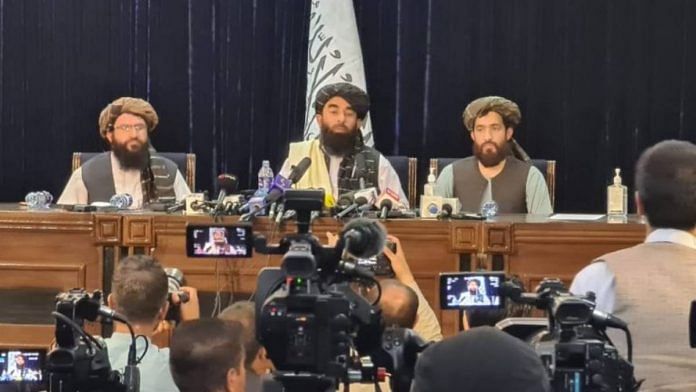New Delhi: India is expected to “talk tough” about the Taliban and Pakistan’s tacit support for the insurgent group at the upcoming Shanghai Cooperation Organisation (SCO) Summit, ThePrint has learnt. This comes despite India’s talks with Sher Mohammad Abbas Stanikzai, the head of the Taliban’s political office in Doha, earlier this week.
Prime Minister Narendra Modi is expected to virtually address the SCO Summit, which will take place in Tashkent on 16-17 September, and is likely to make a strong pitch on India’s “zero tolerance” stance on terrorism in a “strong signal” to Pakistan amid worries that the neighbouring country could use Afghanistan as a terror haven, sources told ThePrint.
Sources also said while India has always believed in engaging with all the stakeholders in Afghanistan, which includes the Taliban, it has also made it clear to them that the insurgent group has to “bridge the gap” between what their leaders announce in Doha and how it is being implemented at the grassroots level.
India wary of Haqqani influence
India, sources added, has also apprised the Taliban leaders of the fact that it is concerned about the increasing responsibilities being given to the Haqqani Network as New Delhi firmly believes it has connections with Pakistan’s ISI.
ThePrint had reported earlier that New Delhi is now waiting to see what role will the Haqqani Network play in the new Taliban government as that will determine India’s next move as far as “recognising” them is concerned.
During the SCO summit this time, a separate meeting of the SCO-Afghanistan contact group will also take place and the Taliban is expected to be represented by Mullah Abdul Ghani Baradar, the co-founder and deputy leader of the insurgent group.
Baradar is touted to be the new foreign minister of Afghanistan under the Taliban rule.
India is also watching what roles will be played by Siraj Haqqani and Anas Haqqani, scions of Haqqani Network founder Jalaluddin Haqqani. The new Taliban government is expected to be announced Friday.
Also read: Islamabad has a problem. Taliban won’t tone down now – in Afghanistan or Pakistan
India watching Haqqani influence
The UN Security Council, under India’s presidency, Monday adopted Resolution 2593 (2021) demanding that the territory of Afghanistan not be used for terrorist activities or as a safe haven particularly for groups such as Lashkar-e-Taiba (LeT) and Jaish-e-Mohammed (JeM). The presidency ended on 31 August.
During the voting of the resolution, Russia and China chose to abstain while the US, UK and France voted in favour along with 10 other non-permanent members. These five countries are permanent members of the UNSC, also known as P-5 countries.
However, despite the split in voting, New Delhi believes it will be able to announce and adopt a resolution containing certain “concrete counterterrorism measures” before India’s tenure as the Chair of the 1988 Taliban sanctions committee comes to an end. The Taliban sanctions committed was formed in 2011 due to the group’s violent activities in Afghanistan.
Sources said this is the main reason why the Taliban is increasingly reaching out to New Delhi to assuage its concerns on terrorism, especially cross-border terrorism.
‘Taliban looking for each vote’
Experts, meanwhile, say that the Taliban of today is not like the Taliban of 1996 when they did not worry about international recognition or legitimacy.
“Contrary to the ’90s, where the Taliban had no international ambitions and the Afghan population was not asking for governmental services, this time the Taliban will care about international recognition and receiving external findings. At this point, the Taliban are looking for each vote, including those of India,” Arash Yaqin, National Security Analyst at Washington-based Institute of World Politics, told ThePrint.
Yaqin highlighted that the Taliban understands the strategic partnership that exists between India and the US and they are aware of the fact that if they want Washington to recognise them then “they need to get India on their side.”
According to Yaqin, France has historically supported the anti-Taliban Northern Alliance so it is waiting to see how the resistance movement in Panjshir Valley pans out.
“If Panjshir falls (to the Taliban) … Paris has no alternative than recognising the Taliban unless the United States wants them to use their veto. From an American perspective, I think (US President) Joe Biden is open to recognising but needs some time to let the current situation cool down,” he said.
He added, “I believe in the long run all five members (of the UNSC) are going to accept the Taliban government.”
Also read: No one knows what the new Taliban is. But the ‘good Taliban’ house of cards is down



